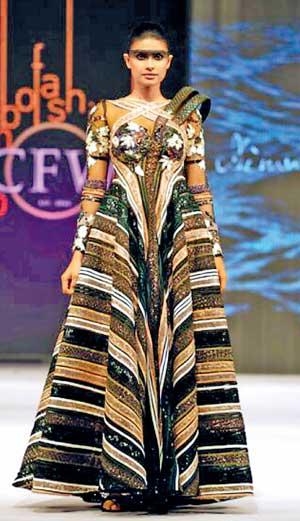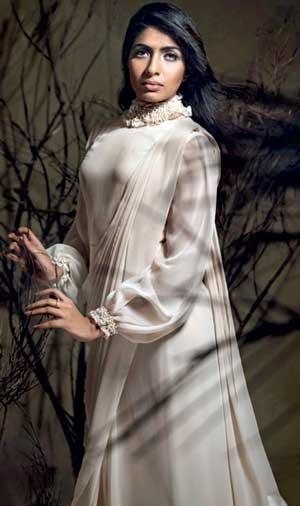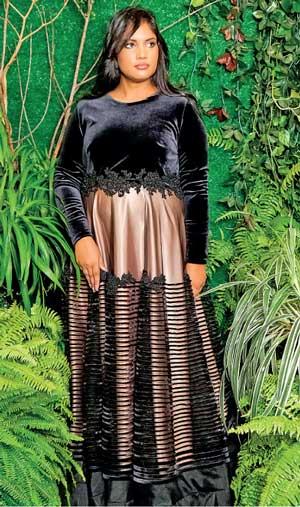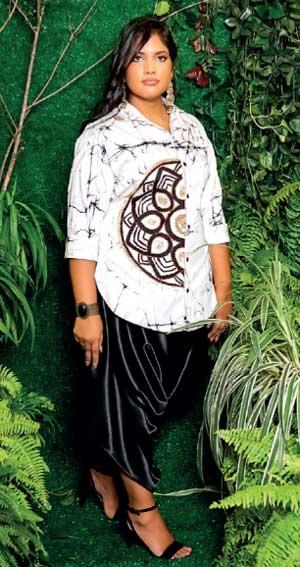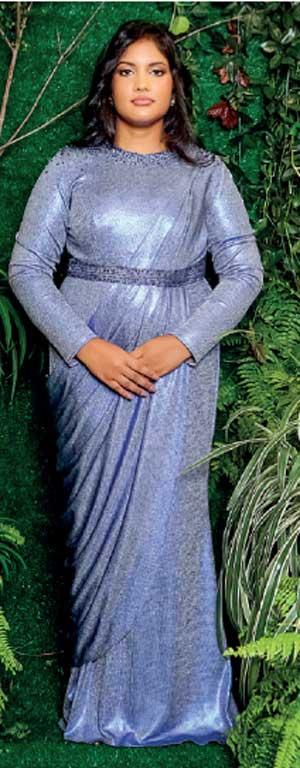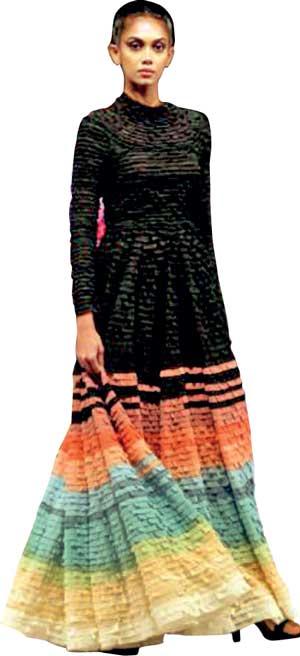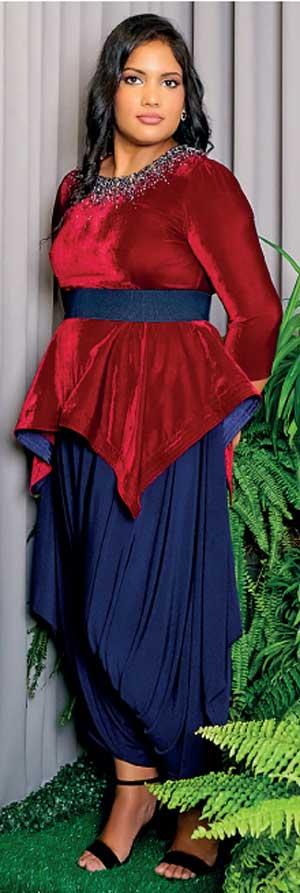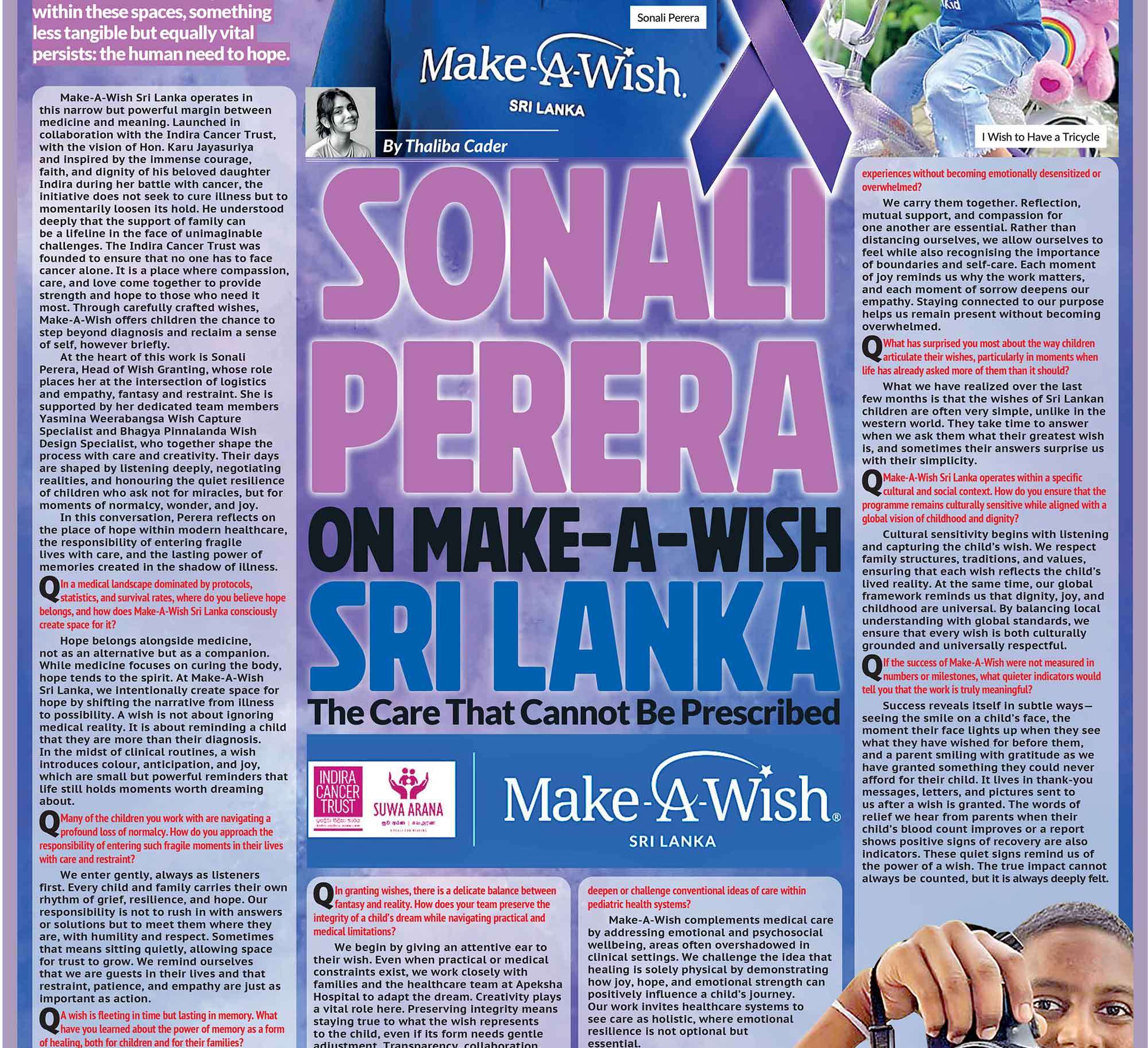“We’re telling stories with every stitch”
 Dimuthu Sahabandu is no stranger to drama, at least not when it comes to fashion. Known for his luxurious eveningwear, bold silhouettes, and signature embellishments, Sahabandu is one of Sri Lanka’s most exciting design voices. But beyond the visual impact, his work carries meaning, rooted in craftsmanship and intent.
Dimuthu Sahabandu is no stranger to drama, at least not when it comes to fashion. Known for his luxurious eveningwear, bold silhouettes, and signature embellishments, Sahabandu is one of Sri Lanka’s most exciting design voices. But beyond the visual impact, his work carries meaning, rooted in craftsmanship and intent.
- This is actually our fourth time showing with The Design Collective in London, and each time has felt like both a challenge and an evolution. We’ve learned so much with every collection, what resonates with that audience, what needs to be adjusted, and that has really helped us refine our approach.
Now presenting his fourth collection in London with The Design Collective, he reflects on the evolving dialogue between South Asian design and global fashion. From structured ruffles to capsule wardrobes, he’s redefining how couture can be both expressive and wearable. Speaking candidly, Sahabandu shares the inspiration behind his latest showcase, how storytelling plays a central role in his creative process, and why sustainability isn’t just a buzzword; it’s a responsibility. This is not just about fashion; it’s about culture, innovation, and identity stitched into every seam.
QYou’ve showcased with The Design Collective in London before. How does this experience compare to previous shows? How involved are Shahili and Binu in the collection you prepare?
This is actually our fourth time showing with The Design Collective in London, and each time has felt like both a challenge and an evolution. We’ve learned so much with every collection, what resonates with that audience, what needs to be adjusted, and that has really helped us refine our approach. Shahili and Binu have played a massive role in that growth. They’re not just curators; they’re collaborators in the truest sense. From the initial design direction to material selection, they’re involved in shaping collections that are not just beautiful, but globally relevant. Their understanding of the international market is one of our biggest strengths in this process.
QHow do you see the international South Asian fashion scene evolving today?
There’s a real shift happening right now. The global fashion world is finally looking towards South Asia, not just for surface-level inspiration but for our heritage, our craftsmanship, our point of view. You see major designers weaving in South Asian techniques and narratives, but at the same time, South Asian designers are stepping into the spotlight on our own terms. What excites me is the growing recognition of our identity and the quality of our work. Big international department stores are now more open to collaborations. As people move away from over-commercialised luxury, there’s space opening up for something more authentic, and that’s exactly where we come in.
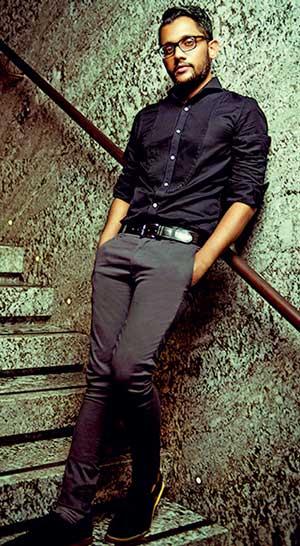 QWhen selecting pieces for a London audience, what key themes or messages do you aim to convey?
QWhen selecting pieces for a London audience, what key themes or messages do you aim to convey?
For London, we focus a lot on the balance between craftsmanship and wearability. The audience there really appreciates the artistry, but they also value functionality and sustainability. So, for this collection, we’ve gone with a capsule of separates, pieces that can stand alone or work together for different occasions. We encourage clients to re-wear and restyle our statement garments. By mixing them with wardrobe staples, the same look can take on completely new energy. It’s about longevity and conscious consumption, not fast fashion. I think that message sits well with London’s fashion-forward yet eco-aware crowd.
QYour eveningwear is renowned for bold embellishments and dramatic silhouettes. How do you ensure your designs remain fresh and wearable?
That’s always the tightrope, isn’t it? I see runway fashion as a space to really express creativity, to go bold and theatrical. But retail has different demands. The key is knowing when to go avant-garde and when to tone it down. The runway helps set the tone for our brand, it shows who we are at our core. But when we move into production for retail, we pull elements from those showpieces and reinterpret them in more wearable, commercial forms. That way, we stay true to our identity while also making sure people can actually wear and enjoy our designs beyond just one night.
QHave you incorporated any new materials or techniques in this collection?What creative directions are you exploring?
Yes! For this collection we’ve really leaned into the idea of structured ruffles. I wanted to explore the contrast between fluidity and rigidity, so you’ll see soft fabrics manipulated into more sculptural forms, almost like controlled movement frozen in time. It’s been exciting to push fabric in that direction. There’s a kind of harmony that comes from combining softness with strength, and I think it reflects where we are creatively as a brand right now.
QHow important is storytelling in your design process, especially with statement pieces?
Storytelling is everything. Every statement piece we create has a narrative behind it, even if it’s subtle. From the fabric we choose to the shape of a sleeve or the placement of an embellishment, every element is intentional. With runway pieces especially, I want the audience to feel like they’re being told a story visually. But I also love that different people take away different meanings. That’s what makes fashion powerful, its ability to speak without words, and its openness to interpretation.
 QCapsule wardrobes have gained popularity globally. How do your glamorous, statement pieces fit within this concept?
QCapsule wardrobes have gained popularity globally. How do your glamorous, statement pieces fit within this concept?
Interestingly, we’ve embraced capsule thinking since the beginning. When I started the brand back in 2010, we were already focused on ready-to-wear pieces that could be styled in multiple ways. The idea was always to give people more value from fewer garments. As we grew into more experimental, statement-driven fashion, we introduced a garment enhancement policy. If someone bought a bold one-piece for a special event, they could bring it back to us and we’d deconstruct it into separates, maybe turn it into a top and a skirt. That way, they could mix it into their everyday wardrobe and extend its life. It’s luxury, but practical. High fashion that evolves with you.
QWhat role do you think sustainability will play in the future of luxury fashion?
I think it’s going to be the most important factor moving forward. People are paying attention, they want to know who made their clothes, how they were made, and what happens to them after. Luxury consumers are no longer just buying beauty; they’re buying values.
For me, sustainability is about more than materials. It’s about design philosophy. It’s about creating things that last, that can adapt, that don’t need to be discarded after one use. As designers, we have a responsibility to do better, and I truly believe the brands that embrace that now will be the ones that thrive in the future.
QReflecting on your journey since your first London pop-up with The Design Collective, how has your approach evolved?
Looking back, I can see how much we’ve grown. That first pop-up was eye-opening. Designing for a market outside Sri Lanka taught me to listen more, listen to different types of feedback, different kinds of buyers, and even new cultural contexts. Since then, we’ve become much more strategic. We understand our international audience better, and we’re more willing to adapt without losing our essence. It’s helped diversify our portfolio, sharpen our design process, and strengthen our brand as a whole. It’s been a learning curve, but one I’ve fully embraced.
